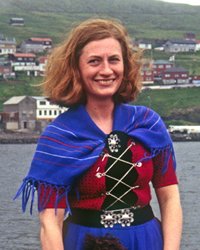Faroe Islander in Faroe Islands

Photo Source:
Charlie Kellogg - Flickr
Creative Commons
|
Send Joshua Project a map of this people group.
|
| People Name: | Faroe Islander |
| Country: | Faroe Islands |
| 10/40 Window: | No |
| Population: | 53,000 |
| World Population: | 75,000 |
| Primary Language: | Faroese |
| Primary Religion: | Christianity |
| Christian Adherents: | 91.00 % |
| Evangelicals: | 34.00 % |
| Scripture: | Complete Bible |
| Ministry Resources: | Yes |
| Jesus Film: | Yes |
| Audio Recordings: | No |
| People Cluster: | Scandinavian |
| Affinity Bloc: | Eurasian Peoples |
| Progress Level: |
|
Introduction / History
The Faroe Islands are an archipelago composed of 18 islands located in the North Atlantic Ocean northwest of Scotland and halfway between Iceland and Norway. Noted as one of the most beautiful and unspoiled areas of the world, the islands cover 545 square miles of hills and low mountains. The climate is moderate considering its location with temperatures averaging 37° F in winter and 52° F in the summer. The islands are a self-governing region of the kingdom of Denmark with a population of 49,000. Fishing and fish products account for the vast majority of the income for the islands. Faroese is the national language and English is widely spoken as well. (1)
The Faroe Islands were first settled by Irish monks in the 6th century AD. The first Norse settlers were farmers. The islands became part of the Kingdom of Norway in the 11th century and came under Danish control in the 14th century when Norway joined the Kingdom of Denmark. Under the 1948 Home Rule Act the islands became self-governing. (2)
Where Are they Located?
The Faroe Islands are an archipelago composed of 18 islands located in the North Atlantic Ocean northwest of Scotland halfway between Iceland and Norway. The islands cover 545 square miles of hills and low mountains. The archipelago covers 545 square miles and is roughly shaped like an arrowhead. There are 687 miles of coastline and no place on the islands is one more than 3 miles away from the ocean. The highest mountain is 2883 feet above sea level and the average height above sea level for the country is 982 ft. The climate is moderate considering its location with temperatures averaging 37° F in winter and 52° F in the summer. (1)
What Are Their Lives Like?
The weather is maritime and quite variable from brilliant sunshine to misty hill fog to showers. The Gulf Stream encircling the islands tempers the climate. The harbors never freeze and the temperature during the winter is very moderate considering the high latitude. Snowfall occurs but disappears quickly. The average temperature ranges from 37° F in winter to 52° F in the summer. In sheltered areas, the temperature can be much higher and the air is always fresh and clean regardless of the season. (1)
The population of the islands is 49,000 with one third of the people living in the metropolitan areas. The fishing industry is the most important source of income for the islands. Fish products account for over 97% of their exports. Tourism is the second largest industry followed by wool and other manufactured products. (1)
Since 1948, the Faroe Islands have been a self-governing region of the Kingdom of Denmark. It has its own parliament and its own flag. It is not, however, a member of the European Union and all trade is governed by special treaties. Art, music and regional fashion design add to the unique culture of the islands. Many different concerts, festivals and gatherings fill the calendar during the warmest months of each year. (1)
Faroese is the national language and is rooted in Old Norse. Nordic languages are readily understood by most Faroese and English is widely spoken as well, especially among the younger people. Most technological advantages of the western world can be found on the Faroe Islands. (1)
What Are Their Beliefs?
Religion plays an important part in Faroese culture with over 80% of the population belonging to the Evangelical Lutheran Church. Around 10% of the population are affiliated with the Christian Brethren (Plymouth Brethren). (1) These facts tie them to two of the most important movements within Christianity: the Protestant Reformation and the Christian Evangelical Movement.
Despite a rather strong founding of faith, this nation, like the rest of the world, is susceptible to being led astray by false teaching. Television, radio, internet and church programs cannot be assumed to be Biblical. As a matter of fact, much of what is being done in the name of Evangelical Christianity is questionable when compared to scripture.
Every nation regardless of wealth and prominence needs kind oversight and instruction from Godly people. The Faroe Islands is open to Christian outreach as evidenced by the large numbers of people who associate with various churches. The opportunity to minister to these churches and to rural peoples of the islands should not be overlooked.
Prayer Points
Pray for God to invigorate His people on the Islands to accomplish His work
Pray for the opportunity to reach out to other island nations in the region
Pray for access for God's people to evangelize the lost